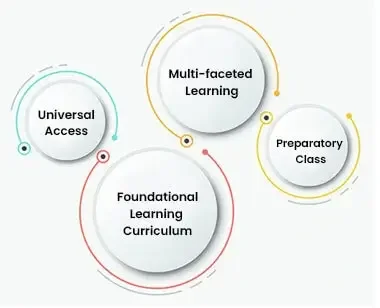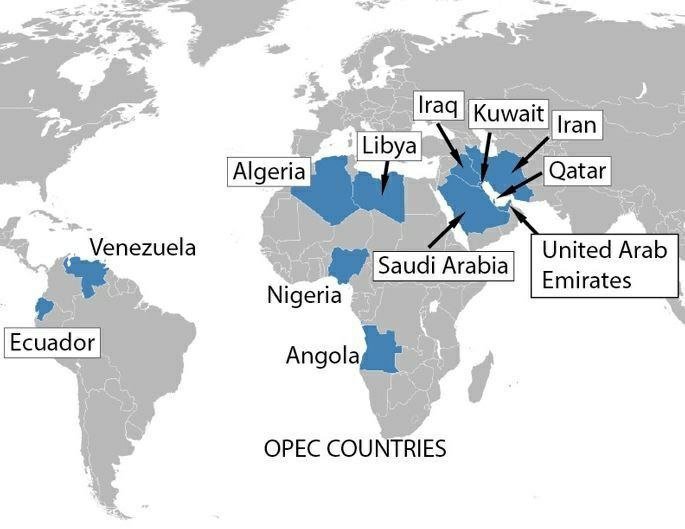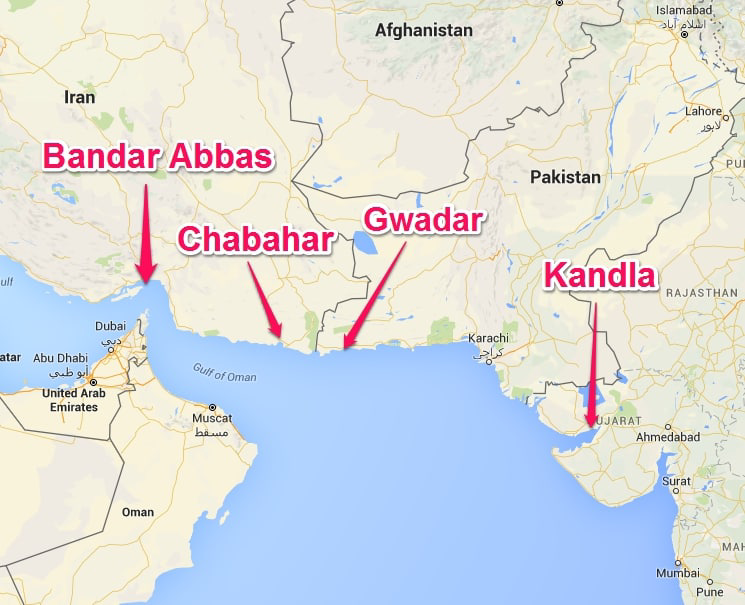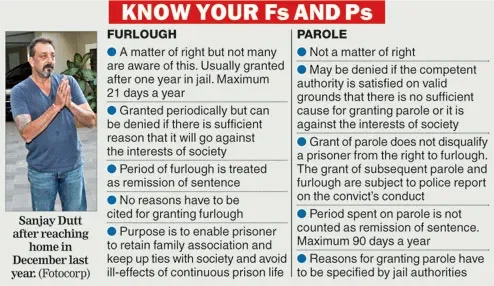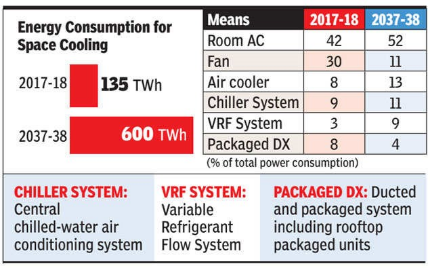
Centre-State Financial Relations
Subscribers of "Current Affairs" course can Download Daily Current Affairs in PDF/DOC
Subscribe to Never Miss an Important Update! Assured Discounts on New Products!
Must Join PMF IAS Telegram Channel & PMF IAS History Telegram Channel
- Context (IE | IE | TH): Several south Indian states (Karnataka, Kerala) are fighting against the Centre over the distribution of central funds.
What are the concerns of the Karnataka government?
- Significant Reduction in the devolution of taxes: The 15th Finance Commission reduced Karnataka’s share in central taxes from 4.71% to 3.64% (a decrease of 22.5% compared to the 14th Finance Commission). This sharing formula made Karnataka the biggest loser in terms of percentage points.
- 15th Finance Commission (FC) recommendations were rejected by the Centre: The 15th FC recommendations were,
- One-time grant of Rs 5,495 crore for the 2020-21 fiscal year (Suggested in 15th FC 1st report).
- Rs 6,000 crore was recommended for the improvement of water bodies and the peripheral ring road for Bengaluru (Suggested in the 15th FC final report).
- Inadequate GST compensation: Karnataka lost Rs 62,098 cr (2020-21 to 2025-26) however, it was not adequately compensated.
- For instance, in 2017-18, when it was eligible for a compensation of Rs 11,044 cr, GST compensation received from the Centre was a paltry Rs 6,246 cr.

- Issue of Cess and Surcharges: Rs 55,000 cr (2017-18 and 2023-24) were collected using cess and surcharge (only in Karnataka), which are not to be shared with the states and are impacting state revenue.
- Discrepancy in Tax Devolution: States Receive Only 30% Instead of the 41% recommended by the 15th FC.
What are the concerns of the Kerala government?
- Fiscal Shortfall:
- Kerala claims a cut of Rs 57,400 crore in its current fiscal receipts by the Centre.
- Additionally, citing an RBI report, the government claims that it receives only Rs 21 against its own tax collection of every Rs 79. However, as per the statistics of 2021-23, on the national average, the Centre is to provide Rs 35 for every Rs 65 collected by the states.
|
- Goods and Services Tax (GST) compensation issue: Kerala lost a significant revenue source of Rs 12,000 crore this year after the Centre ended the GST compensation.
- Consistent Decrease in the devolution of funds: Kerala’s share in tax devolution during the 10th FC period was 3.87%. This has come down to 2.5% in the 14th FC and to 1.925% in the 15th FC.
- 15th Finance Commission criteria is unfavorable.
- The FC, for deciding the share of taxes for states, sets various parameters and looks at the states’ performances in that regard. (Parameters are mentioned in the diagram)
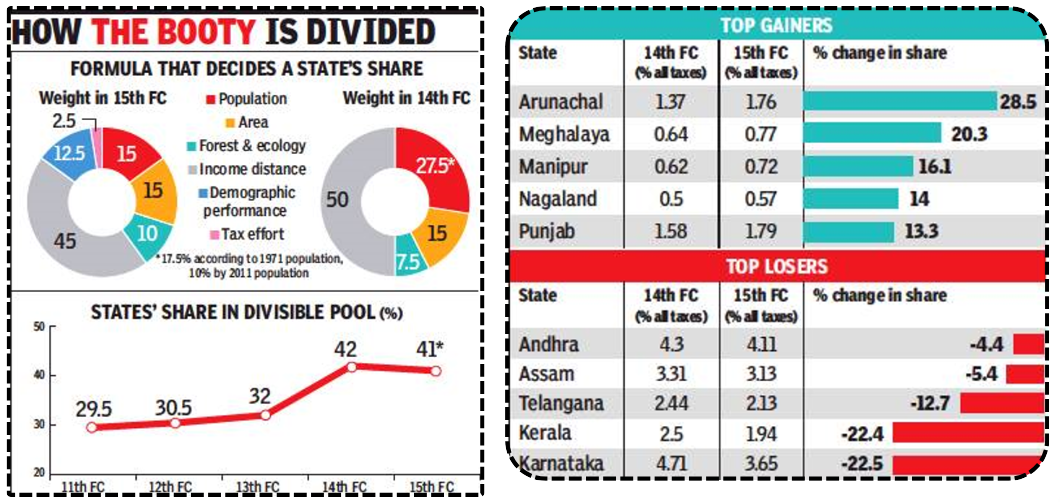
- But Kerala states that its effective birth control measures (demographic performance) have contributed to the fall in the allocation of central tax.
- The state wants the Centre to consider second-generation development problems, lifestyle diseases, and the growing proportion of elderly in the population.
- Issues regarding Centrally Sponsored Schemes
- Kerala had submitted proposals for financial assistance under the Scheme for Special Assistance for Capital Expenditure, but it did not comply with some norms, particularly branding/naming of five central-sponsored projects in Kerala.
- Kerala is against co-branding of these projects as the state contributes 40 per cent of the share. This results in the delayed transfer of both Capex and Central Share of Centrally Sponsored Schemes.
- Further, Rs 600 crore under the National Health Mission and Rs 2,500 crore under Special Assistance for Capex have not been released so far.
- Unexpected Cut in Borrowing Limits: Under the Centre’s guidelines, Kerala’s approved borrowing limit is Rs 39,626 crore. However, Kerala has been restricted to borrowing only Rs 28,830 crore so far. The borrowing limit was unexpectedly reduced without prior notice.
|
-
Inclusion of off-budget borrowings as state loan
- Kerala has undertaken off-budget borrowings mainly for the Kerala Infrastructure Investment Fund Board (KIIFB) and Kerala Social Security Pension Limited (KSSPL).
- In 2017, the Union Finance Ministry stipulated that all such borrowings of state government entities will also be taken into consideration while setting the state’s borrowing limits.
- Thus, the Kerala budget had to make provisions for repaying the borrowings by KIIFB and KSSPL.
- The inclusion of such off-budget borrowings as the state’s borrowing has, therefore, brought down its net borrowing ceiling.
|
How do states receive income from the central government?
Major Recommendations of the 15th Finance Commission (2021-2026)The Finance Commission is a constitutional body formed by the President of India to give suggestions on centre-state financial relations. The share of states in central taxes
GrantsRevenue deficit grants
Sector-specific grants
State-specific grants
Grants to local bodies
Disaster risk management
Criteria for devolution
Fiscal roadmapFiscal Deficit
Borrowings
Revenue mobilisation
Creation of Fiscal bodies
Health
Funding of defence and internal security
Centrally sponsored schemes (CSS)
|




![PMF IAS Environment for UPSC 2022-23 [paperback] PMF IAS [Nov 30, 2021]…](https://pmfias.b-cdn.net/wp-content/uploads/2024/04/pmfiasenvironmentforupsc2022-23paperbackpmfiasnov302021.jpg)


